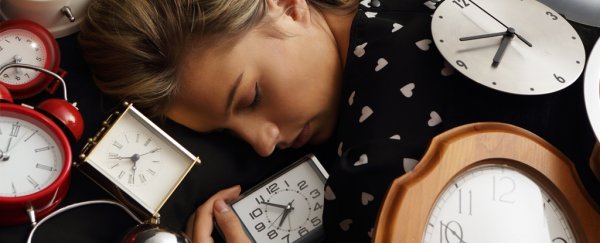While the link between sleep and a healthy heart is well established, researchers are still sussing out the details. A new study suggests there might even be an optimal time, within our 24-hour body clock, for falling asleep.
Of course, the reasons for not obtaining the right sleep, whether it's the best amount or right timing are not always within our control. So anyone struggling with their sleep should seek medical advice and focus on whatever they need to do that works for them – as dictating a specific bedtime may be counterproductive for some.
But for the rest of us it may be helpful to know that falling asleep between 10-11 pm seems to hit the sweet spot for a healthy cardiovascular system.
"The body has a 24-hour internal clock, called circadian rhythm, that helps regulate physical and mental functioning," says University of Exeter psychologist David Plans.
"While we cannot conclude causation from our study, the results suggest that early or late bedtimes may be more likely to disrupt the body clock, with adverse consequences for cardiovascular health."
Analyzing wrist-worn accelerometer data from 88 ,026 participants in the UK Biobank study, a research team led by first author Shahram Nikbakhtian from digital healthcare company Huma Therapeutics AI was able to compare sleep timing over a seven-day period with later health outcomes.
The dataset included 3,172 cases of cardiovascular disease, during almost six years of tracking participants.
The team found falling asleep after midnight or before 10 pm both was associated with around a 25 percent increase in risk of cardiovascular disease, compared to falling asleep between 10-11 pm. This increase in risk dropped to 12 percent for those who fell asleep between 11-12 pm.
"The riskiest time was after midnight, potentially because it may reduce the likelihood of seeing morning light, which resets the body clock," says Plans.
This trend remained when taking into account age, gender, sleep duration, being an early bird or night owl, smoking status, weight, diabetes, blood pressure, cholesterol level, and socioeconomic status. It was also more pronounced for women, but the researchers aren't yet sure why.
"It may be that there is a sex difference in how the endocrine system responds to a disruption in circadian rhythm," Plans suggests.
"Alternatively, the older age of study participants could be a confounding factor since women's cardiovascular risk increases post-menopause – meaning there may be no difference in the strength of the association between women and men."
This sort of study can't determine if sleep timing itself contributes to heart disease – it may be other behaviors linked to staying up late, like staying out drinking or stress keeping people awake that are causing the problems.
The study was also limited by age, socioeconomics and ethnicity – predominantly wealthier white people between 43 to 79 years old – so may not necessarily hold true for other demographics.
However, the use of biometric data eliminates potential recall biases that could be present in studies relying on survey data.
What's more, results align with previous research showing increased risk of cardiovascular problems for people with delayed bedtimes, and with what we understand about the physiology of our body clock: that it needs a regular timed reboot.
"Misalignment of behaviors and the circadian clock increases inflammation and can impair glucose regulation, both of which can increase risk of cardiovascular disease," Plans told The Guardian.
As diseases of the heart and blood vessels are the leading cause of death worldwide, including in the US, this trend is definitely worth further investigation.
"If our findings are confirmed in other studies, sleep timing and basic sleep hygiene could be a low-cost public health target for lowering risk of heart disease," Plans concluded.
This research was published in the European Heart Journal – Digital Health.
